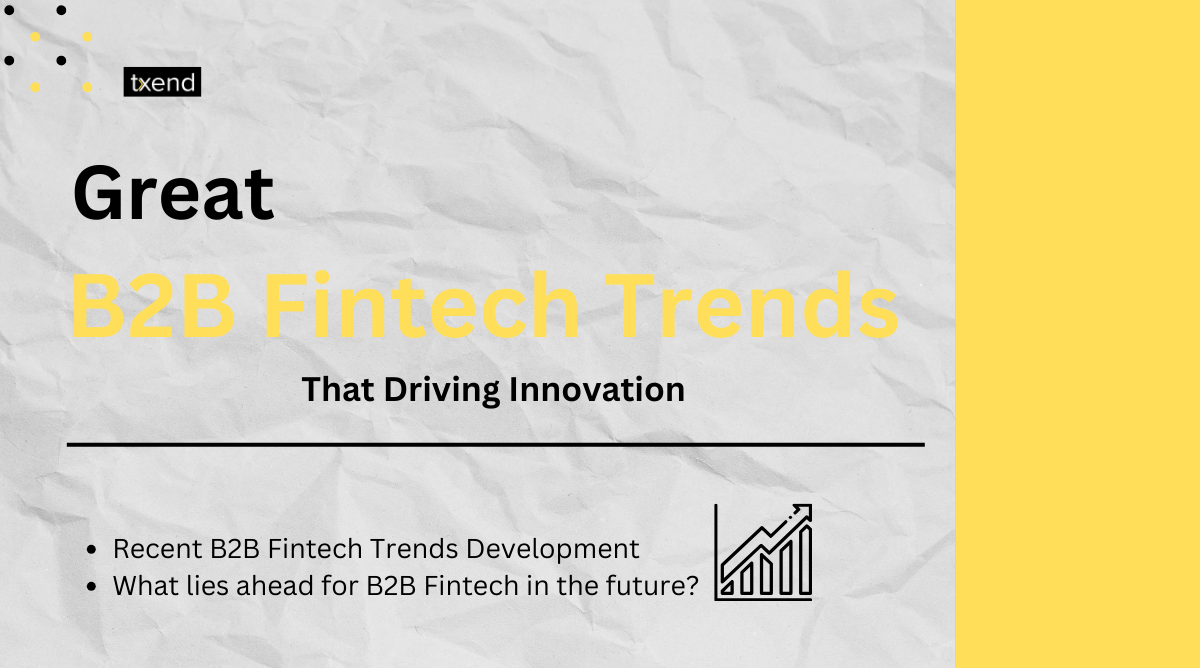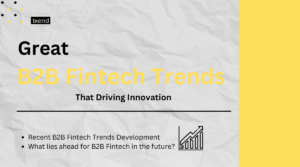Step into the ever-evolving realm of fintech, where innovation fuels the reshaping of B2B financial realms. In this article, we embark on a journey to explore the latest B2B fintech trends that are shaping the industry.
From cutting-edge fintech technology trends to the broader spectrum of trends in fintech, we’ll delve into the innovations that are redefining how businesses manage their financial operations. Join us as we uncover the strategies, technologies, and shifts in the fintech landscape that are propelling businesses toward a more efficient and competitive future.

Key Takeaways
- Recent B2B fintech developments include the increased adoption of blockchain for supply chain finance and the rise of embedded finance solutions in various industries.
- The future of B2B fintech promises enhanced AI-driven financial analytics and the continued expansion of blockchain applications in various industries.
Recent B2B Fintech Trends Developments
In the ever-evolving landscape of B2B fintech, the United States is at the forefront of innovation. Here, we’ll uncover the latest B2B fintech trends reshaping the industry, demonstrating how these trends are driving innovation across the financial sector.

The Rise of Digital-Only Banking
In the ever-evolving world of B2B fintech, digital-only banking is at the forefront. Companies are increasingly embracing this trend to streamline financial operations, reduce overheads, and enhance security. The USA is witnessing a surge in digital-only banking solutions, revolutionizing how businesses manage their finances.
Catalyzing B2B Transactions with Fintech Integration
Embedded finance is reshaping B2B interactions by seamlessly integrating financial services into various business processes. This trend is empowering businesses to access loans, manage cash flow, and make payments without leaving their core platforms. In the USA, the concept of embedded finance is gaining momentum, leading to enhanced convenience and efficiency.
Navigating Fintech Regulations
Amidst the fintech revolution, regulatory frameworks are crucial. The USA’s fintech landscape is characterized by evolving regulations, impacting how businesses operate in the financial sector. Staying compliant is paramount, making it essential for B2B entities to navigate and adapt to the changing regulatory landscape.
Payment Innovations and Digital Wallets
The adoption of innovative payment methods and digital wallets is revolutionizing B2B transactions in the USA. These fintech solutions are optimizing payment processes, reducing costs, and enhancing security. Businesses are harnessing the power of digital wallets to streamline transactions and maintain financial agility.
In this digital transformation era, these B2B fintech trends are not only reshaping the financial landscape in the USA but also presenting opportunities for businesses to drive innovation, efficiency, and growth.
What lies ahead for B2B Fintech in the future?
AI Revolutionizing B2B Fintech
The future of B2B Fintech in the USA is prominently marked by the emergence of Artificial Intelligence (AI). AI is set to transform how businesses manage financial operations, offering predictive insights, automated processes, and enhanced decision-making capabilities.

Blockchain’s Role in Financial Management
Blockchain technology is poised to revolutionize financial administration in B2B settings. Its decentralized and secure nature will redefine transaction transparency, supply chain finance, and even digital identity verification.
Predictive Analytics
Predictive analytics is set to play a pivotal role in B2B financial strategies. By harnessing data-driven insights, businesses can anticipate market trends, manage risks, and optimize their financial decision-making processes more effectively than ever before.
International Collaboration
The future of B2B Fintech in the USA extends beyond its borders, with increasing collaboration and partnerships with B2B Fintech companies in the UK. These global alliances will foster innovation, expand market reach, and promote the exchange of fintech expertise.
These developments together depict a constantly changing and dynamic B2B Fintech environment in the United States. In this landscape, innovation and the shaping of businesses’ financial future will remain driven by technology, data, and international cooperation.
Conclusion
In conclusion, the evolving landscape of B2B fintech trends is ushering in a new era of innovation at an unprecedented pace. In the contemporary business landscape, enterprises function within a dynamic milieu characterized by a close and intricate integration of technology and finance.
In this rapidly changing landscape, staying abreast of these trends is not just advisable; it is paramount for any company aiming to maintain a competitive edge in the B2B fintech sector.
One of the most striking characteristics of the current B2B fintech landscape is the relentless pace of innovation. The fusion of finance and technology has given birth to various cutting-edge solutions that revolutionize how businesses manage their financial operations.
From AI-powered predictive analytics to blockchain-based supply chain finance, these innovations streamline processes, reduce costs, and enhance the overall efficiency of financial transactions within the B2B sphere.
This innovation is not merely cosmetic; it is reshaping the fundamental fabric of financial services. For instance, using artificial intelligence and machine learning algorithms fundamentally transforms how credit risk is evaluated.
B2B fintech companies can now provide more accurate and data-driven insights into the creditworthiness of potential business partners. This not only reduces the risk of defaults but also opens up new avenues for financing opportunities.

Furthermore, the shift towards more user-centric fintech solutions is evident. User experience is no longer a secondary consideration but a primary driver of fintech design. B2B fintech platforms are becoming more intuitive and user-friendly, which simplifies complex financial tasks.
This improved accessibility empowers businesses to make better-informed decisions, regardless of their level of financial expertise.
Sustainability and ESG considerations are also gaining prominence in the B2B fintech landscape.
Amid the increasing worldwide attention on environmental, social, and governance aspects, B2B fintech firms are incorporating ESG criteria into their services and products.
This not only enables businesses to align with ethical and responsible practices but also attracts socially conscious investors and partners, expanding the realm of possibilities for collaboration and growth.
Looking forward, the horizon of B2B fintech trends is teeming with promise. As technology continues its rapid progression, we can anticipate the emergence of increasingly groundbreaking innovations.
From decentralized finance (DeFi) solutions to quantum computing applications in finance, the future holds boundless possibilities for those willing to embrace the transformation.



